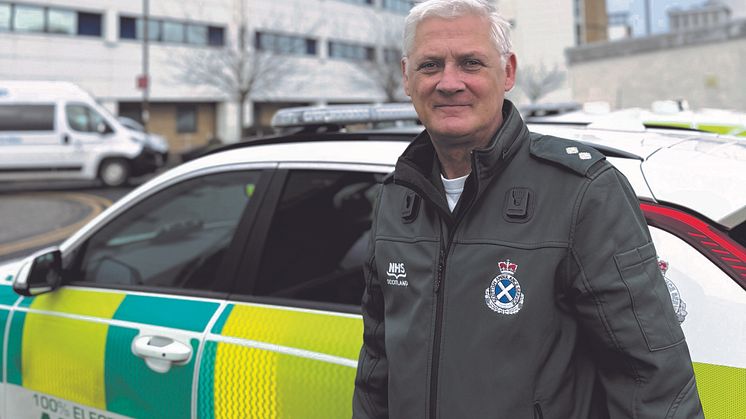
Press release -
Strokes rising in younger people, but 90% of strokes preventable
Charity asking people to check blood pressure this Stroke Prevention Day
The Scottish Stroke Statistics published today1 (Tuesday, 28 January) are a sobering reminder that Scotland’s record for stroke is deteriorating, the Stroke Association warns.
In 2023/24, there were 9,792 strokes in Scotland compared to 9,851 in 2022/23. However, a higher proportion are in younger age groups. The proportion of people having a stroke aged under 65 has risen by 19.7% in the last 10 years, while the equivalent figure for the under 45s is a rise of 8.9% in the last 10 years.
The number of people dying from a stroke in Scotland is also rising. The stroke mortality rate has increased by 6.3% since 2022/23, which is the highest rise since 2016.
Nine in ten strokes are preventable2, with lifestyle factors such as diet, fitness, alcohol and smoking playing a big part. Certain health conditions such as diabetes, atrial fibrillation, high cholesterol and high blood pressure can also contribute.
To mark Stroke Prevention Day (Thursday, 30 January) the Stroke Association is focusing on the link between high blood pressure and stroke, as there is low awareness of the link and tackling high blood pressure can reduce the risk of a stroke.
John Watson, Associate Director for the Stroke Association in Scotland, said: “People in Scotland are significantly more likely to have a stroke than elsewhere in the UK, and more likely to die from it3.
“It’s a complex picture, but for Stroke Prevention Day the Stroke Association is simply asking people to check their blood pressure regularly. High blood pressure is the cause of around half of all strokes4 and checking for it could prevent life-changing disability and death.
“High blood pressure can be treated with medication while exercising, lowering salt intake, reducing alcohol consumption and quitting smoking can all pay dividends.”
High blood pressure often has no symptoms. All adults should have their blood pressure checked at least every five years. Anyone suspecting they have high blood pressure should check it regularly. Some GP practices will provide a blood pressure monitor to take home or they can be bought from pharmacies and other retail outlets.
The Stroke Association is part of the ‘Our Future Health’ partnership, which is a collaboration between the public, charity and private sectors to help everyone lead longer and healthier lives. It has already set up more than 100 UK clinics where people can get basic health checks, including nine in central Scotland.
In rare cases, high blood pressure may cause symptoms. Speak to your GP if you have symptoms of very high blood pressure including:
•headaches
•blurred or double vision
•regular nosebleeds
•shortness of breath
The Stroke Association supports stroke survivors and their families by phone, at home, and in the community. Find out more at www.stroke.org.uk
Case study
Ian Stark, 60, from Edinburgh is a Hospital Ambulance Liaison Officer, having worked with the Scottish Ambulance Service since 1991.
While working as a paramedic team leader in December 2017, he had a persistent headache and noted high blood pressure readings, which he put down to stress. The following morning, he felt strange while driving to work – almost as if he was drunk. When he arrived, his legs gave way and concerned colleagues put him in an ambulance and took him to the Royal Infirmary of Edinburgh.
Once there, a stroke clinician checked for signs of the condition and found Ian’s speech was slurred, he couldn’t raise his left arm, and his left leg buckled.
The next thing he knew he woke up that afternoon in the stroke ward. He had been given thrombolysis, which is a clot-busting drug, his speech had returned to normal, and his left side had started to recover. Ian was discharged from hospital within 72 hours and returned to work with the Scottish Ambulance Service a month later.
He says, “I should have paid attention to my high blood pressure sooner, and I might have prevented my stroke. I would have advised a patient very differently. I wholeheartedly support the Stroke Association’s advice to check your blood pressure regularly – it can point to potential health problems.”
Topics
References
2.Nine in ten strokes are preventable https://pubmed.ncbi.nlm.nih.go...
3.Global Burden of Disease Study 2021 (GBD 2021) https://vizhub.healthdata.org/...
4.54% of strokes are caused by high blood pressure https://pubmed.ncbi.nlm.nih.go...
About the Stroke Association
• Around 10,000 people have a stroke in Scotland every year.
• Mums, dads, grandparents, young people, even children – anyone can have a stroke, and its impact is traumatic.
• Brain damage, caused by a stroke, can leave survivors unable to move, see, speak or even swallow.
• The Stroke Association is Scotland’s leading stroke-specific charity providing life-long support to stroke survivors and their families. We raise awareness of stroke, fund vital scientific research, and campaign to bring the best care and support for everyone affected by stroke.
• Anyone affected by stroke can visit stroke.org.uk or call our dedicated Stroke Support Helpline on 0303 3033 100 for information, guidance or a chat when times are tough.
• You can follow us on X or Facebook











